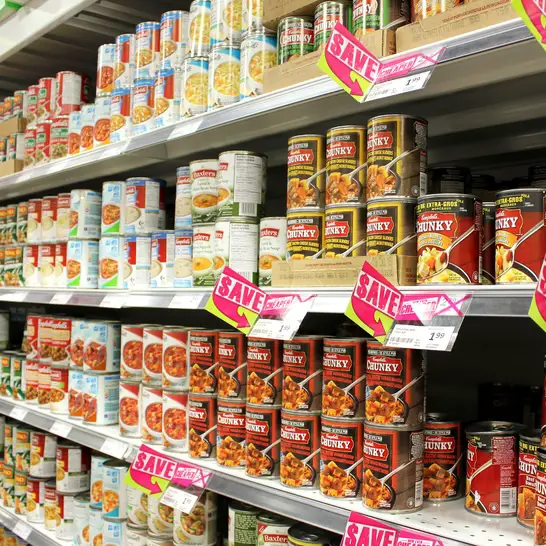Who doesn’t love a warm, comforting bowl of soup on a chilly day? It’s a quintessential comfort food that many of us turn to for a quick and easy meal. But before you stock up on those convenient cans and boxes of store-bought soup, you might want to take a closer look at what’s really inside. Recent studies have uncovered some alarming facts about many popular soup brands that might make you think twice before reaching for that can opener.
Sodium overload: a recipe for health problems
One of the biggest offenders in store-bought soups is sodium. Many popular brands pack an astonishing amount of salt into each serving. For instance, Campbell’s Chunky Pub-Style Chicken Pot Pie soup contains a whopping 1,720 mg of sodium per serving – that’s more than 70% of the recommended daily intake in just one meal!

High sodium intake is linked to numerous health issues, including increased blood pressure, water retention, and a higher risk of heart disease. What’s more, consuming too much sodium can lead to bloating and discomfort, making you feel less than stellar after your supposedly comforting meal.
Even soups labeled as “healthy” or “organic” aren’t off the hook. For example, Amy’s Organic Soups, while made with quality ingredients, can still contain high amounts of sodium. Always check the nutrition label, regardless of the brand’s health claims.
The hidden sugar in your savory soup
You might expect to find added sugars in desserts or sodas, but in your soup? Surprisingly, many store-bought soups contain significant amounts of added sugars. Some cans pack up to 20 grams per serving – that’s 5 teaspoons of sugar in your supposedly savory meal!
Excessive sugar consumption is linked to a host of health issues, including obesity, type 2 diabetes, and heart disease. What’s more, these added sugars often serve no nutritional purpose and are simply there to enhance flavor or act as a preservative.
Be particularly wary of creamy soups and those with sweet vegetables like corn or carrots. For example, Campbell’s Homestyle New England Clam Chowder contains 6 grams of added sugar per serving, which might come as a surprise to many consumers.
Saturated fat: the silent threat in creamy soups
Creamy soups might taste delicious, but they often come with a hefty dose of saturated fat. Some popular brands of cream-based soups can contain up to 9 grams of saturated fat per serving – that’s nearly half of the recommended daily limit!
High intake of saturated fat is associated with increased LDL (bad) cholesterol levels, which can raise your risk of heart disease and stroke. What’s more, these fatty soups are often high in calories, which can contribute to weight gain if consumed regularly.
Be especially cautious with “chunky” varieties and those labeled as “hearty” or “creamy.” For instance, Progresso Rich & Hearty Chicken Corn Chowder Flavored with Bacon contains 7 grams of saturated fat per serving, making it a less-than-ideal choice for heart health.
BPA: the chemical lurking in your can

It’s not just the soup itself that can be problematic – the packaging can pose risks too. Many canned soups are lined with a chemical called Bisphenol A (BPA), which has been linked to various health concerns.
A study by Harvard researchers found that people who consumed canned soup for five days had BPA levels in their urine that were 1,221% higher than those who ate fresh soup. BPA exposure has been associated with issues like reproductive problems, heart disease, and certain types of cancer.
While many manufacturers are moving away from BPA, it’s still present in some canned products. Companies like Campbell’s and Progresso have made efforts to remove BPA from their can linings, but it’s always worth checking the packaging or contacting the manufacturer if you’re concerned.
Artificial additives and preservatives
Many store-bought soups contain a laundry list of artificial additives and preservatives. These ingredients are used to enhance flavor, improve texture, and extend shelf life, but they may come with potential health risks.
One common additive to watch out for is sodium phosphate. This compound has been linked to an increased risk of heart disease and other health problems. Other additives like monosodium glutamate (MSG) and various artificial colorings have also been associated with adverse health effects in some individuals.
When shopping for soup, look for brands with short, simple ingredient lists. For example, Pacific Foods offers several soups with minimal additives, focusing instead on whole food ingredients.
Low fiber content: missing out on essential nutrients

Many store-bought soups, especially those that are broth-based or creamy, are surprisingly low in fiber. Fiber is essential for digestive health, helps maintain stable blood sugar levels, and can aid in weight management.
The average adult should aim for 25-30 grams of fiber per day, but many canned soups contain less than 1 gram per serving. For instance, Campbell’s Chicken Noodle Soup contains less than 1 gram of fiber per serving, making it less filling and nutritious than it could be.
To boost the fiber content of your soup, consider adding your own vegetables or choosing varieties that are bean or lentil-based, such as Amy’s Organic Lentil Soup, which provides 8 grams of fiber per serving.
Misleading serving sizes
One sneaky tactic used by some soup manufacturers is manipulating serving sizes. Many cans of soup list the nutrition information for only half or even a third of the can, despite the fact that most people consume the entire can in one sitting.
This means that if you’re not paying close attention, you could be consuming two or three times the amount of sodium, fat, and calories listed on the label. Always check the number of servings per container and adjust your calculations accordingly.
For example, a can of Progresso Traditional Broccoli Cheese soup lists the serving size as about 1 cup (240mL), but the can contains about 2 servings. If you eat the whole can, you’re actually consuming 1,400 mg of sodium, not the 700 mg listed for a single serving.
The deceptive “health halo” effect
Many store-bought soups are marketed as healthy options, using buzzwords like “natural,” “organic,” or “low-fat.” However, these labels can be misleading. A soup might be organic but still high in sodium, or low-fat but loaded with added sugars.
This “health halo” effect can lead consumers to overestimate the nutritional value of these products and potentially overconsume them. Remember, even soups from health-focused brands can be high in sodium and other less-desirable ingredients.
For instance, while Panera Bread’s grocery store soups might seem like a healthier choice, their Broccoli Cheddar Soup contains 770 mg of sodium and 13 grams of saturated fat per serving – numbers that might surprise health-conscious consumers.
Store-bought soups can be a convenient option, but many are far from the healthy, comforting meal they’re often perceived to be. High levels of sodium, hidden sugars, saturated fats, and potentially harmful additives make many popular brands a risky choice for regular consumption. However, this doesn’t mean you have to give up on soup entirely. By being a savvy consumer, carefully reading labels, and perhaps even making your own soups at home, you can still enjoy this classic comfort food without compromising your health. Remember, when it comes to nutrition, knowledge is power – and now you’re armed with the information you need to make healthier choices in the soup aisle.

